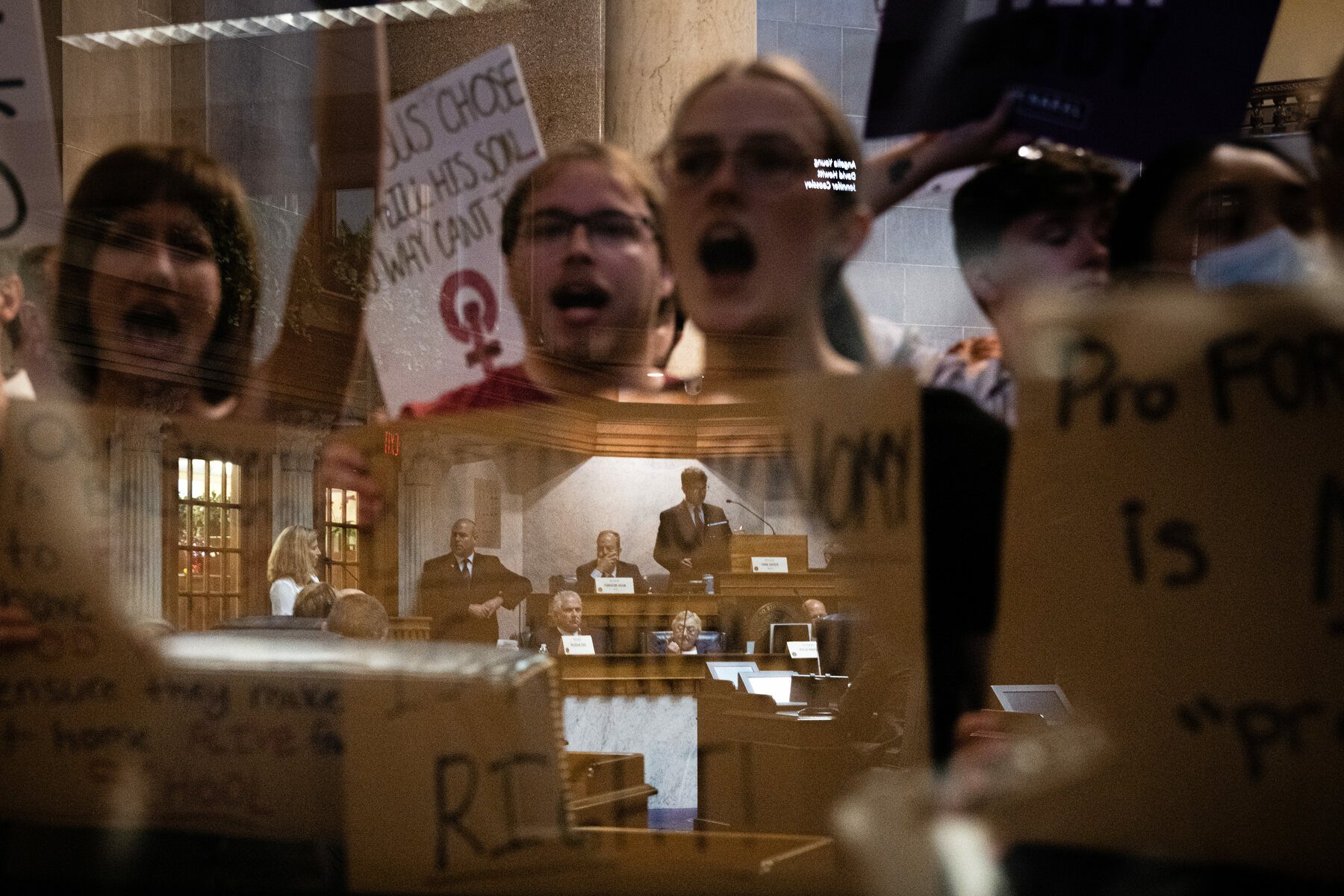INDIANAPOLIS — Indiana senators voted 26-20 on Saturday to advance a bill that bans nearly all abortions except in cases of rape, incest or when the parent’s life is at risk. Those exceptions had to survive a drawn-out challenge during the amendment process.
Days prior, the senators had convened to consider amendments to a bill that no one was happy with when it passed out of the Committee on Rules and Legislative Procedure on Tuesday. Republicans and Democrats alike critized the proposed legislation, some arguing it didn’t go far enough to restrict abortion and others arguing it went too far.
The heated debate during the committee review and the amendment process demonstrated strong divisions in the Republican Party and the wide range of opinion over how far abortion restrictions should go.
The Republicans hoped that bringing the draft to the full Senate would help clarify the legislation, close any loopholes and satisfy their constituents. More than 60 members of the public testified for hours on Monday to Tuesday to voice their critiques, leading to frustration from the bill’s author, Sen. Sue Glick.
“Am I happy with the bill? Not exactly,” Glick said at the time. “Nor was I happy when it was drafted. … We’ll bring it to the floor so we can discuss it in detail, and if it’s the will of the body to kill the bill on the floor — then so be it.”
About half of those who testified, including all of the anti-abortion organizations that were represented, were against the bill because they felt it didn’t go far enough to restrict abortions and did not include an adequate enforcement measure. Many medical professionals argued that the language was too vague, making it hard for them to both provide care and avoid criminal charges. Others who testified in opposition to the bill said that any infringement on a person’s ability to make their own health care decisions was a government overreach.
Sen. Ed Charbonneau, a Republican on the committee, said he hoped the full Senate and any amendments would make a “bad bill less bad.”
The full Senate convened on Thursday to consider 62 filed amendments, the highest number several of the lawmakers said they had seen for one bill. The session was delayed by nearly four hours as Republicans met behind closed doors. Then, for more than seven hours, Democrat and Republican senators alike discussed, argued and occasionally called for more decorum when the conversation became emotional and personal.
One amendment, however, took center stage: one that would remove the rape and incest exceptions and only allow abortions that threatened the life of the pregnant person.
“Exceptions equal death,” said Republican Sen. Michael Young, who introduced the amendment.
More than two and a half hours of tearful debate, questioning and statements revealed that Democrats were united to keep the rape and incest exceptions in the abortion ban, while Republicans were divided down the middle.
“This is the most important issue in our lifetime,” Young said in his closing remarks before the vote. “And whatever we decide here tonight, we will be judged by what we did. We have to do the right thing.”
The amendment failed to pass with an 18-28 vote.
Though 62 amendments were filed and dozens were discussed on Thursday, nearly 30 were rejected and only four amendments were passed. Several amendments had already been passed in committee on Tuesday, including added criminal charges to doctors who illegally perform abortions, an eight-week limit on when victims of rape could obtain an abortion (12 weeks for minors) and a requirement that victims of rape sign an affidavit before terminating their pregnancies.
Of those passed on Thursday, one gave the attorney general authority to enforce a law if a prosecuting attorney is “categorically refusing” to do so. Republican Sen. Aaron Freeman introduced the amendment, citing the Marion County Prosecutor Ryan Mears, a Democrat, who said in June that his office would not prosecute women or doctors who sought or performed abortions.
“The prosecutor’s office in the state of Indiana is to prosecute all crimes,” Freeman said. “Their job is not to pick and choose which laws they’re going to enforce. If they want to do that, I would recommend they run for state legislature and begin passing laws that they want to either have or not.”
Senate Minority Leader Sen. Greg Taylor, a Democrat, said that the body had already voted down this measure the year before. Taylor said passing it in a special session was troubling to him, particularly given the current attorney general is currently facing a lawsuit filed by the doctor who provided abortion for the 10-year-old girl from Ohio.
“That is flat out wrong,” Taylor said, adding that it failed to pass last session because prosecutors spoke out against it. “[Freeman’s] going to take prosecutorial discretion away by saying the attorney general at any time has concurrent jurisdiction over those prosecutors. That’s bad. Shame on us.”
Another added amendment, introduced by Democratic Sen. Timothy Lanane, tweaked the requirement for victims of incest: if the victim is a minor, there is no longer a requirement to obtain consent from a parent or guardian. A third amendment, introduced by Democrat Sen. Jean Breaux, authorized the statewide maternal mortality review committee “shall study how changes in the state’s abortion laws affect maternal mortality.” And the fourth amendment, introduced by Republican Sen. Liz Brown, requires that the affidavit signed by rape victims is notarized.
Amendments that did not pass include: a requirement that pregnancy resource centers to be licensed; the expansion of telehealth services to abortion medication; the creation of a review panel to deal with complaints against physicians that would then direct the attorney general’s office to enforce; one that would ensure access to housing for pregnant and post-partum women with a child under one; a requirement that perpetrators of rape pay child support until their child turns 18; and another that would put the issue of abortion on the ballot for voters to decide its legality.
The bill is expected to head to the House next week. According to Indiana code, the special session has to conclude by August 14.







